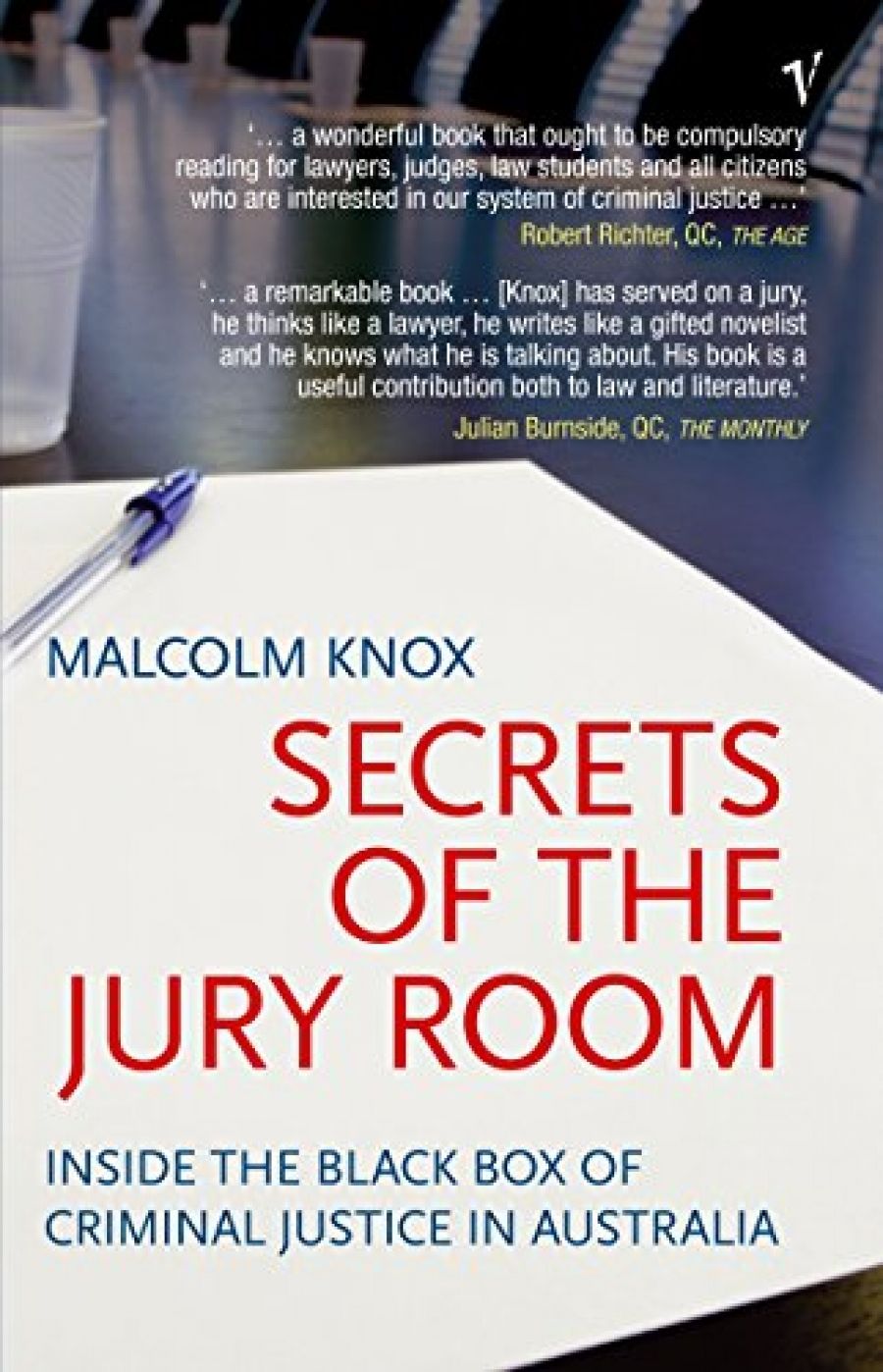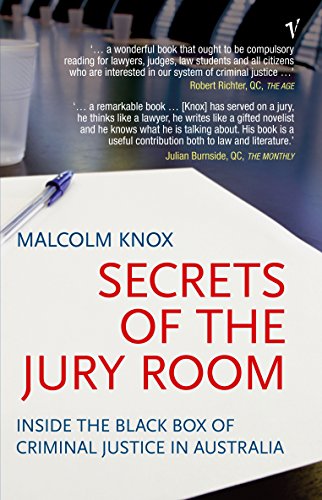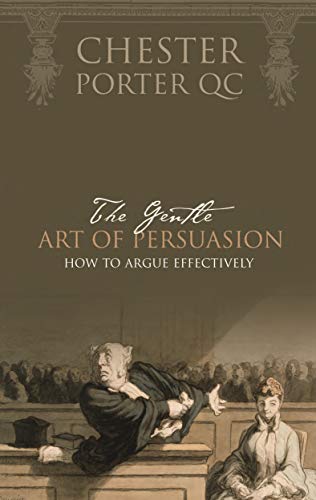
- Free Article: No
- Contents Category: Non-fiction
- Review Article: Yes
- Article Title: Means of persuasion
- Online Only: No
- Custom Highlight Text:
According to Aristotle, rhetoric is ‘the ability, in each particular case, to see the available means of persuasion’. In today’s parlance, the term is often used pejoratively, connoting an obfuscation of truth. This would come as no surprise to Aristotle, whose treatise on the topic, Rhetorica, demonstrated an acute awareness of the dangers posed by the adroit manipulation of the means of persuasion for dubious ends.
- Book 1 Title: Secrets of the Jury Room
- Book 1 Subtitle: Inside the black box of criminal justice In Australia
- Book 1 Biblio: Random House, $32.95 pb, 374 pp
- Book 1 Cover Small (400 x 600):

- Book 2 Title: The Gentle Art of Persuasion
- Book 2 Subtitle: How to argue effectively
- Book 2 Biblio: Random House, $32.95 hb, 235 pp
- Book 2 Cover Small (400 x 600):

Until his retirement in 2000, there were few better lawyers in this country than Chester Porter. Malcolm Knox, on the other hand, abandoned his legal studies to pursue a successful career as a novelist and journalist. Porter’s reputation, livelihood and moniker (‘The Smiling Funnelweb’) were earned through half a century at the bar, depending greatly on his skill in convincing juries of the merits of his cases. Knox, whose book draws on his experiences as a juror, presents a view from the other side of the court.
The Gentle Art of Persuasion: How to argue effectively is the second book Porter has released since retiring. Curiously, unlike his well-received memoir Walking on Water: A Life in the Law (2003), Porter has chosen to make prominent on the cover of his new book his title ‘QC’. Aristotle warned against the use of ethos in the form of earned titles, suggesting that effective appeal from ethos need not rely on such decoys. The deployment of this epithet, along with the jacket design, depicting a desperately pleading advocate, seems at odds with the author’s stated intention. The Gentle Art of Persuasion is avowedly not intended to be part of a study guide for the bar, with Porter ambitiously declaring that: ‘This book is intended to aid anyone who wants to argue convincingly.’
To broaden the applicability of his lessons, Porter delves into his past as a university debater, Rostrum speaker and critic, and his youthful flirtations with politics. It is when discussing pathos, and the proclivity of our politicians to inveigle the public, that Porter’s otherwise measured tone dissipates. Perhaps wilfully blind to the low esteem in which lawyers are held, Australians, says Porter, ‘despise their politicians and, in my opinion, deservedly so. Elections have become pig-trough offers in which the electors are invited to wallow in monetary benefits provided out of their own tax payments. Electors are treated as stupid fools.’
Porter is insistent on the ethical need not to appeal to base emotions: ‘misusing one’s power to appeal to the emotions may well bring loud applause. Do not be intoxicated by undeserved cheers.’ That Porter repeatedly uses Hitler and Goebbels as exemplars of such artful spuriousness, however, seems strangely old-fashioned in light of the more contemporary examples of political abuse of popular sentiment that recent works such as David Marr and Marian Wilkinson’s Dark Victory (2003) have highlighted.
Porter’s book is instructional, sometimes bizarrely so: a half-page warning against the perils of knocking over a glass of water while speaking seems unnecessary at best, patronising at worst, particularly in a book that continually exhorts its readers not to underestimate their audience.
Perhaps the central message of Porter’s book is a warning against abusing the powers of rhetoric, as a talented orator has ‘acquired a powerful weapon that can be a force for good or evil’. This concept, while important and here eloquently expressed, is hardly revolutionary; it is familiar, for instance, to all those who saw the recent Spiderman blockbuster, with its repeated motto: ‘with great power comes great responsibility’ – a contemporary reference the omission of which the 79-year-old Porter can be forgiven. Ultimately, for a book that deals with the importance of knowing your audience, it is hard to imagine a readership for whom this good-natured and well-intentioned book will be more than a rather quaint diversion.
Porter’s true audience has always been the jury, which he describes as ‘often an enigma’. He would enjoy the insights offered in Malcolm Knox’s Secrets of the Jury Room. The dramatic origins of this immediately absorbing book are outlined in the Author’s Note, in which Knox explains: ‘For three years I tried to work out how to publish this book without going to jail.’ Originally slated for release in 2002, the legal objections of the accused in the trial on which Knox was empanelled necessitated a masking of the identifying features of the case, delaying the book’s release. Knox has expertly surmounted his legal obstacle by creating a fictional defendant, Steve Rusher: ‘I must work on him with a novelist’s skills: cobble him together out of ghosts, memories, fantasies and little bits of real people.’ The result is a brilliantly wrought melange: part crime novel, part rumination on the jury system, and part plea for reform.
The fraught origins of this book infuse it with a layer of tension that both parallels and enhances that of the trial depicted. Knox’s creation, Steve Rusher, whose trial comprises the narrative backbone of this book, is a vividly rendered character. Rusher’s desperate custody battle lands him in a Sydney prison. From his cell, Rusher continues his desperate custody battle, engaging dubious characters ostensibly to ‘serve papers’ on his former wife and her female lover. The Crown, relying on a series of recorded conversations, charges Rusher with having solicited the pair’s murder.
In weaving the several strands of his book around his fictional defendant, Knox declares his ambition to ‘have penetrated beyond the literal recording of facts, and reached a kind of truth that novelists, rather than historians, attempt to find’. There is something almost ‘gonzo’ in this distinction, which Knox, as a Walkley Award-winning journalist, doubtless appreciates. The porous boundary between fiction and fact is frequently, and often fruitfully, traversed by writers; however, it also presents certain dangers. Few would be more aware of these than Knox, who won his Walkley Award for his part in the exposure of Norma Khouri’s memoir Forbidden Love (2003) as a fabrication. Fiction as a means to truth can be treacherous, but one of the reasons why Knox succeeds is that the book’s fictional component is interwoven with convincing and carefully researched non-fictional elements. This book benefits from a massive amount of research, which Knox succeeds in distilling judiciously, ensuring that what is lost in terms of narrative flow is compensated for by a deeper understanding of the complexities of a system that Knox presents as requiring reform.
A tone of constructive indignation pervades Knox’s reflection on the various constraints and exasperations encountered both as a juror and, subsequently, as a citizen attempting to air his grievances. Knox questions whether the idea of deliberative democracy underpinning our jury system is best served by imposing the existing, stringent constraints upon jurors. The protection afforded juries is depicted by Knox as unnecessarily repressive. His experience and research have left him convinced that the jury system is both sufficiently robust and important to warrant – indeed necessitate – informed and public analysis and debate.
That the ‘Twelve Angry Suggestions’ with which Secrets of the Jury Room culminates are so compelling is testament to Knox’s own powers of persuasion. While Porter insists that the audience must never be underestimated, he nonetheless advocates that they be protected from the dangers of the abuse of rhetoric. Knox, who like Porter asserts his faith in the innate good sense of the citizenry, on which the jury system depends, advocates the loosening of protections in favour of democratic freedoms. While the book’s gripping fictional strand employs pathos, Knox never indulges in the manipulation or sensationalism of which Porter is so wary. Knox’s significant book succeeds and, ultimately, persuades.


Comments powered by CComment